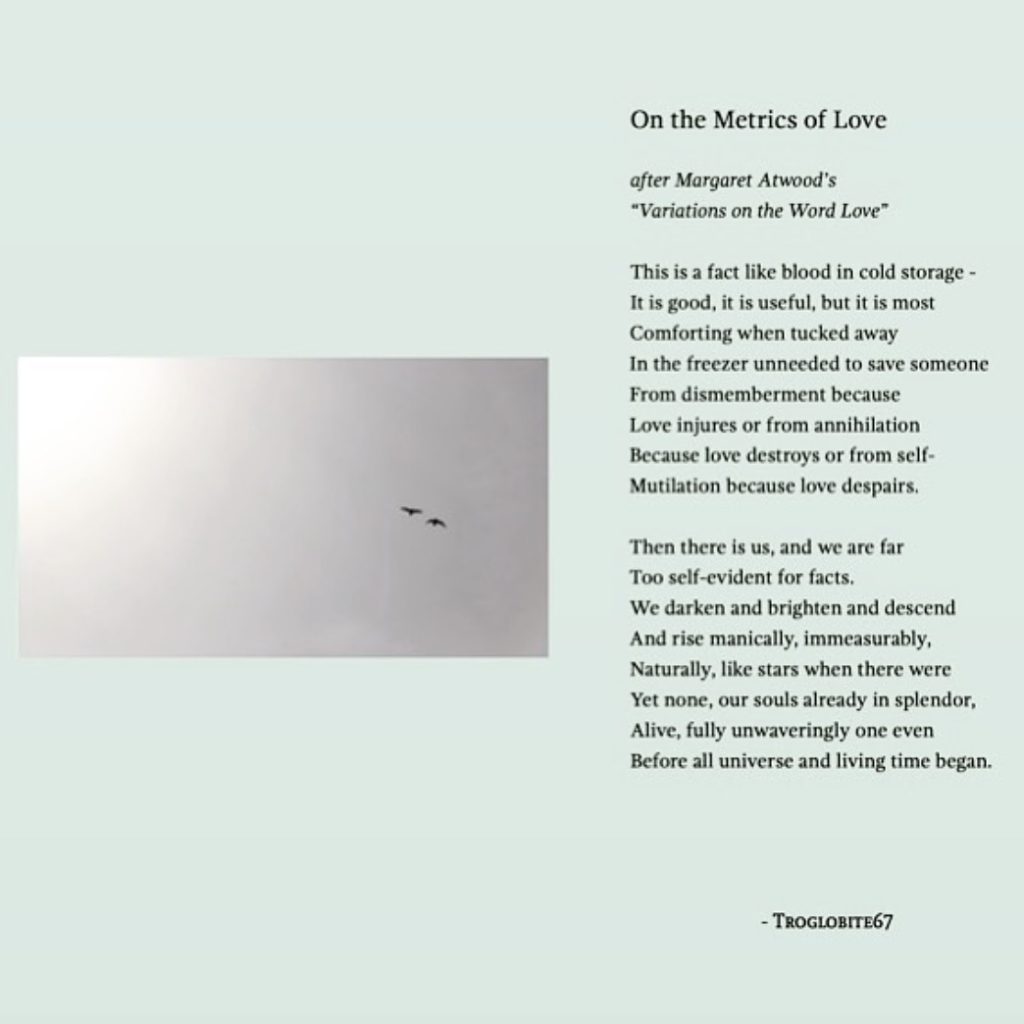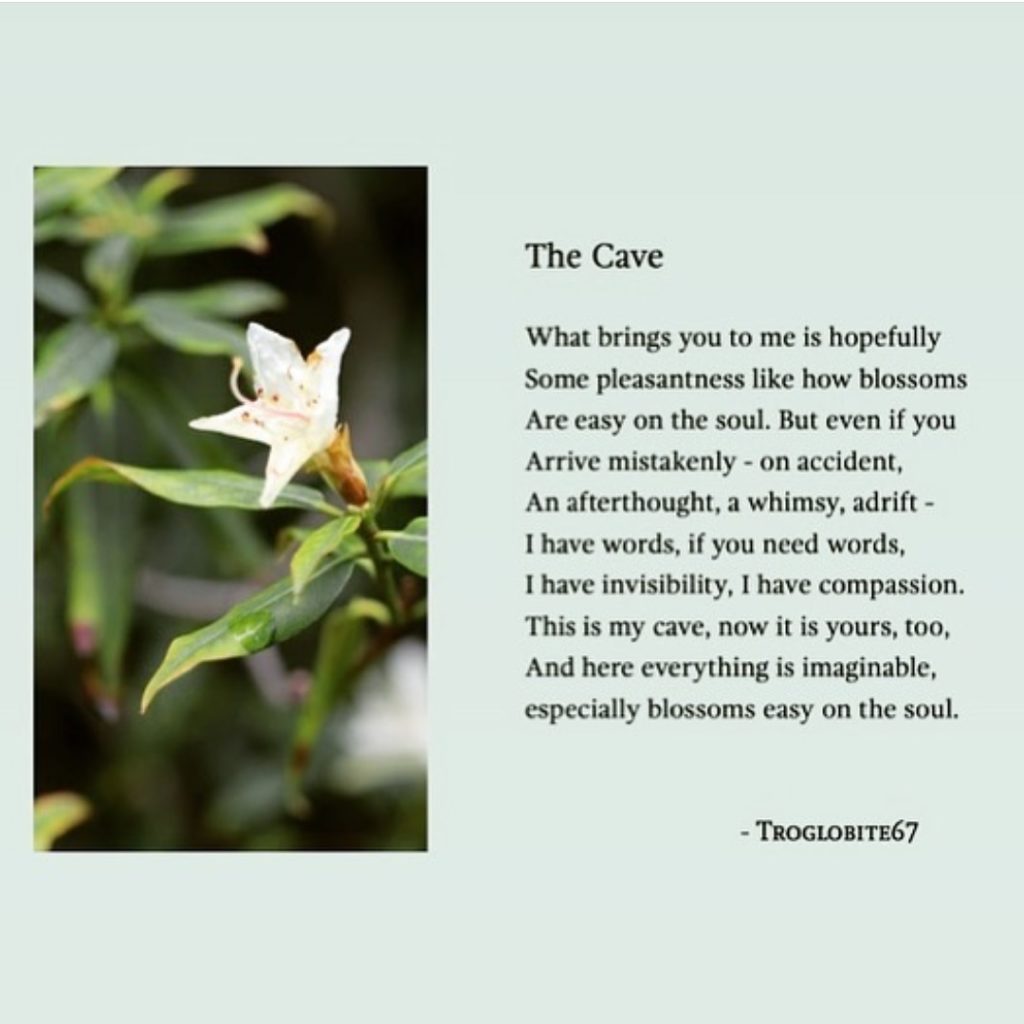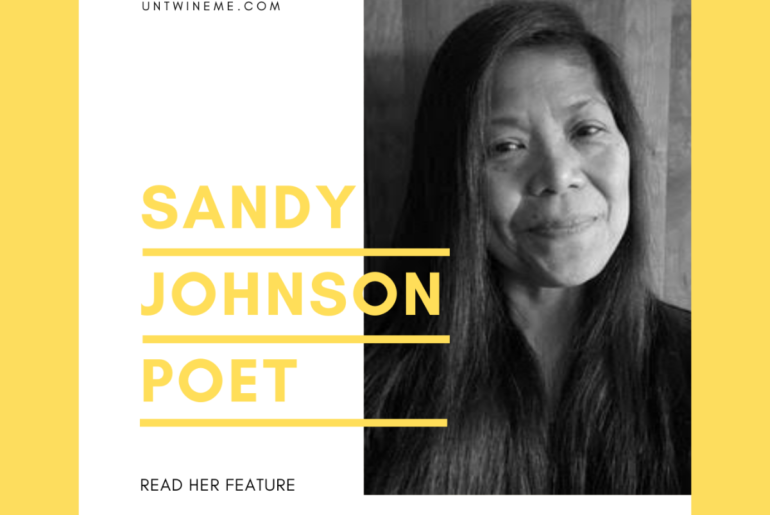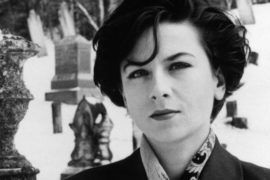The contemporary literary field, especially for poetry, may rightfully be claimed by people under the age of 22 who accounted for more than 40% of over 1.3 million poetry books sold in 2018 (UK Nielsen BookScan). A 2019 study points to Instagram, in particular, as the platform bolstering this trend most popularly among young poetry writers and readers (Kovalik & Curwood). There are, however, a significant number of poets, not as young but equally gifted, who are thriving on Instagram. Today we feature one of them. We reached out to Sandy Johnson @Troglobite67 to get to know her and her cerebral poetry more.

Q: Do you come from a literary background?
A: No, my parents met as teachers in high school.
Q: Did you write as a child?
A: No. It was only in first year highschool when I had an exceptional English teacher that I started gaining fluency. Before then my English was broken because of my bilingual background.
Q: How did you start writing poems?
A: I wrote plays in college but not poetry. I started in 2015 when after returning to graduate school I took the mandatory poetry course, and the work was more writing poetry than studying it. And then the option of writing a creative thesis was given to me, so I took it and for six months or so I wrote poems for my thesis.
Q: Do you find writing easy?
A: No, and I think it shouldn’t be. I think poetry writing is work, and work – the real kind, the kind that matters – is, by its very nature, serious and hard.
Q: How do your poems develop?
A: I write poetry to understand. I write from memory, I write about art and culture, people, history; I perceive the world around me and then I write as I try to understand it.
Q: How do you feel about failure in poetry?
A: As one who writes poems, I am about 5 1/2 years old, so failing is definitely something I do often. I think what’s helped me the most is that like a 5 1/2 year old child, I’m okay with stumbles, I’m not in a hurry to grow up, and being able to write is like being able to go to the playground – I’m just thankful I can.
Q: Can you explain that more in terms of your professional experience?
A: I believe there is a finite number of things we can be good at, that our purpose here is to optimize those things so that our existence is useful and meaningful everyday, and that those things have seasons. Like when I was a lawyer, it served a purpose; now I’m a Montessori teacher, and I hope I am contributing as such, and I am also writing poetry. But I’ve taught since 1987 so as a teacher I’m an adult but in the world of poetry writing, I had just left gestation and started breathing on my own. So I figured what needs to happen is to grow as a poet, in my own time, on my own terms.
Q: So you’re saying as a poet, you’re 5 1/2 years old?
A: Yup!
Q: You have ways to go!
A: Yes – to be a child in my fifties – it’s nice!
Q: Yes, I actually get the sense from your poetry as well as from the way you craft your Instagram posts – your Instagram page has the feel of a museum; it’s like you are purposely curating. There is intent behind each post and reason for how you sequence and place them – that it’s all about the literary experience and not so much ambition or book sales.
A: I’m just lucky. I love my teaching job, which is the same one I’ve had for the past 19 years. I have the most supportive husband, and I’m old! Our daughters are all grown, we have retired from inline speed skating (can you believe we used to compete as a family at Nationals), and so I have the space and the time to write, just write, and yet be serious and deliberate about the writing.
Q: You really are writing every day, aren’t you?
A: Yes. It’s a gift. And I’m honoring it as best as I can.

Sandy is 54 years old, has a bachelor’s degree in literature, a bachelor’s degree in secondary education, a bachelor’s degree in law, and a master’s degree in multicultural English literature and language, and for SY 2021-2022, she is studying for her second master’s degree, this time, in Montessori education. Certainly one may say that her rich professional background, combined with her refreshingly childlike yet joyfully intense personality makes her one of the most brilliant poets to read on Instagram. Her poems never fail to place me in a thinking place, is how I can best put it. The emotional and cerebral aspects of her poetry have a humanizing impact upon careful reading.
Follow @Troglobite67 on Instagram.
References:
Ferguson, Donna. (2019, January 21). Poetry sales soare as political millenials search for clarity. The Guardian. www.theguardian.com/books/2019/jan/21/poetry-sales-soar-as-political-millennials-search-for-clarity
Kovalik, Kate and Jen Scott Curwood. (2019). “#poetryisnotdead: understanding Instagram poetry within a transliteracies framework.” Literacy, 53 (4), 185-195.






